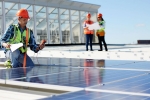Investment acceleration: SEZs' charm polished
This article has been translated by PwC Indonesia as part of our Indonesia Infrastructure News Service. PwC Indonesia has not checked the accuracy of, and accepts no responsibility for the content.
Bisnis Indonesia - Akselerasi investasi: Pesona KEK dipersolek
13 January 2023
By: Annasa Rizki Kamalina and Maria Elena
Bisnis, Jakarta – Several special economic zones (SEZs) must be organised to support investment realisation this year. There are four SEZs that must be optimised, namely Morotai, Sorong, MBTK, and Likupang.
In the evaluation of SEZ performance last year, the SEZ National Council revealed that there were several projects that have developed well, so they could sustain investment realisation in 2022.
The SEZ National Council logged that the amount of investment made by operators and investors in SEZs throughout 2022 reached Rp113.2 trillion.
That realisation is boosted by several industry-based SEZs, such as Galang Batang SEZ, Kendal SEZ, Gresik SEZ, Sei Mangkei SEZ, and tourism-based SEZs, such as Mandalika SEZ, Lido SEZ, Tanjung Kelayang SEZ, Tanjung Lesung SEZ, Singhasari SEZ. The increase in investments also occurred in Nongsa SEZ that could attract investments for data centres, digital, as well as the film industry.
Moreover, Coordinating Minister for Economic Affairs Airlangga Hartarto revealed that the government was continuously boosting SEZ construction in Indonesia.
He reckoned that investments were the key to support the advancement of SEZ construction that is expected to continue increasing.
“For 2023, investment realisation [in SEZs] will reach Rp61.9 trillion,” he said who is also the SEZ National Council Chairperson in his official statement on Thursday (12/1).
On Wednesday, the SEZ National Council officially set Kura-Kura in Bali as a new tourism SEZ through the development of a marina and a resort. This area is located on Serangan Island in Denpasar, Bali.
With the development, the SEZ National Council forecasts that the total investment value will reach Rp104 trillion in the next 30 years. Kura-Kura SEZ is expected to provide 35,000 direct jobs and 64,000 indirect jobs.
Airlangga revealed that the establishment of Kura-Kura SEZ was an effort to secure US$31.8 billion of foreign exchange, which is equal to Rp487 trillion.
With this additional SEZ, the number of SEZs has reached 20 areas that consist of 10 industrial SEZs and 10 tourism SEZs.
On a separate occasion, Coordinating Ministry for Economic Affairs Secretary Susiwijono Moegiarso is encouraging operators to take a strategic step to attract investors to the areas.
“We are encouraging operators to immediately take a strategic step to realise investments for the construction of the areas and to attract investors to the areas. We are actively evaluating and resolving several technical issues,” he explained when he was contacted by Bisnis on Thursday (12/1).
However, from the evaluation of investment realisation and SEZ development in 2022, several hinderances were found, such as control issue, lack of infrastructure support from the government, land management, as well as lack of ability of developers to provide funding.
Moreover, he added that the lack of the managements’ capacity and business plan to attract investments were also issues, including the lack of incentives provided that does not make investors interested in investing.
Hence, to attract investors, the government through the SEZ National Council must provide a direction to adjust regulations and facilitate investment permits through the online single submission (OSS) system.
Other strategic steps include financing schemes prepared by the government, such as special export assignment (PKE) and public-private partnership (PPP).
However, Susi revealed that, overall, several SEZs had been operating optimally.
“There are several SEZs that have been operating optimally that will be boosted, such as Galang Batang, Kendal, Gresik, Sei Mangkei, Mandalika, Nongsa, and BAT (Batam Aero Technic) SEZs,” he explained.
However, he added that he reckoned that there were several SEZs that must be boosted so that they could develop significantly, such as Morotai SEZ, Sorong SEZ, MBTK (Maloy Batuta Trans Kalimantan) SEZ, and Likupang SEZ.
Industrial estate
Meanwhile, Centre of Economic and Law Studies (Celios) economist Bhima Yudhistira revealed that SEZ managerial must follow existing successful industrial estates, such as areas in West Java.
Besides that, he added that the government must learn from cases in Vietnam and China where regional governments play an active role and operators race to provide incentives required by potential investors.
Bhima said that the government must also study issues at every SEZ, then look for a solution.
“Not everything can be solved by tax incentives. From time to time, the problem is the availability of human resources near the area, access to raw materials, and clean water availability. The problems of every SEZ are very specific, so they cannot be generalised,” he said to Bisnis on Thursday (12/1).
Besides that, Bhima reckoned that there were several conditions to boost green SEZ development.
He reckoned that not all SEZs could be transformed into green areas. For example, the area must be near a nickel reserve to construct a factory for electric vehicle batteries.
“Then, electricity from NRE (new renewable energy) must meet the capacity. The next stage is to look for potential investors with an environmental vision or high ESG (environment, social, and governance) standards.”
















